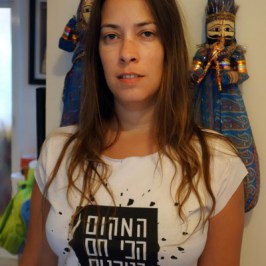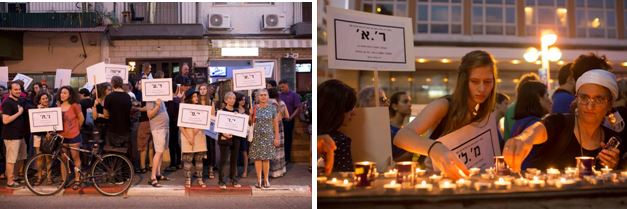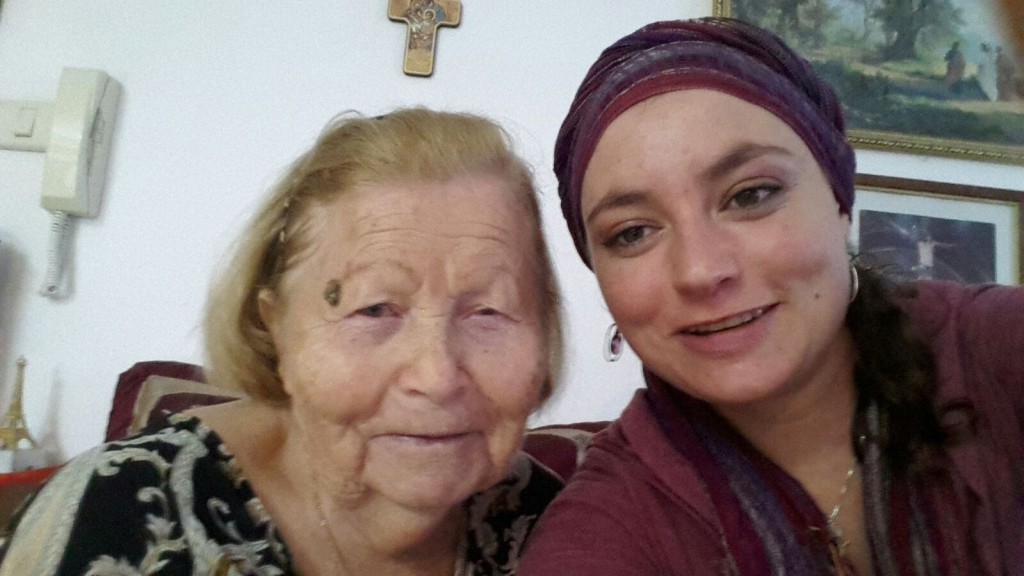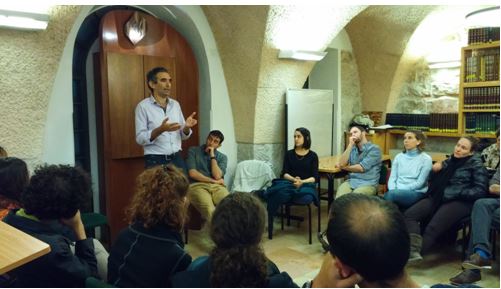The Knesset 2016 Winter Session has just commenced and will soon consider legislation prepared by TFHT and Government Ministers spanning both sides of the political divide. In advance of this extraordinary opportunity to advance Nordic Model legislation in Israel and leading up to International Day for the Elimination of Violence against Women (November 25), TFHT has prepared a Legal Primer (Vol. II) outlining in simple term the very complicated legislative process.
A Brief Primer on Prostitution in Israel
Prepared by the Task Force on Human Trafficking and Prostitution,
an Initiative of ATZUM – Justice Works and Kabiri-Nevo-Keidar
(Volume II – October 2016)
Prostitution’s Legal Status in Israel
In Israel it is legal for adults to purchase and sell sex. However, purchasing sexual services from a minor is punishable by three years in prison; pimping carries a five-year sentence; and it is illegal to traffic in persons, own or operate a brothel, or advertise for sex. Despite existing law to define and police prostitution in Israel, demand continues to increase and enforcement is minimal, leaving Israel’s flesh trade a thriving industry where the average age of entry is 14.
First National Survey on Prostitution in Israel
The Ministries of Social Affairs and Public Security recently published the first national survey on prostitution in Israel. The survey of 600 adult females in prostitution refers to data collected up to 2014. Below are select findings:
- There are between 11,200 and 12,000 people in prostitution in Israel, 95% female.
- 1,260 minors were found to be active in prostitution.
- 62% of women surveyed reported being mothers, 80% of whom have children under 18.
- 65% of women surveyed reported having less than 12 years of education.
- 52% of women surveyed were born in the Former Soviet Union and Eastern Europe, 97% are Israeli citizens and 86% are Jewish.
- There are approximately 670 adult sex websites, reflecting a shift in procurement.
- The primary reason reported for entry into prostitution was economic hardship.
- 80% of the women working in brothels, “discreet” apartments, massage parlors and on the street have expressed a desire to leave prostitution.
It was estimated that Israel’s sex industry handles NIS 1.2 billion ($308.2 million) annually. The Social Affairs Ministry’s current budget for combating prostitution is NIS 22 million ($7.5 million), two-thirds earmarked for dealing with minors, though many maintain current laws protecting the underage are inadequate and difficult to implement. From the data we see that while Israel has succeeded in appreciably decreasing trafficking into the country, Israeli women of low socio-economic status continue to be drawn into the world of prostitution.
Worldwide Legislative Models for Addressing Prostitution
The most discussed ways to address prostitution in Israel include attempting to regulate it as a commercial industry, or modifying current law to criminalize its purchase and decriminalize the prostituted person, nearly always a girl or woman coerced into sexual servitude.
- Realities of Legalization and Decriminalization: Legalization includes making lawful activities involved in and surrounding prostitution, often imposing “industry-specific” regulations. Countries and states that have legalized prostitution include: Senegal (1969), states in Australia including Victoria (1994) and Queensland (1999), the Netherlands (2000), and Germany (2002). Decriminalization includes repealing all laws or provisions against prostitution. Countries and states that have decriminalized prostitution include the Australian State of New South Wales (1995), and New Zealand (2003).[1] Below is a look at some of the realities in countries that have legalized or decriminalized prostitution:
- Holland – After legalizing prostitution in 2000, only 1,000 of Holland’s estimated 30,000 prostituted persons were able to meet the legal criteria to be identified as licensed sex workers, thus falling short of providing relevant protections. Moreover, the government and non-profit organizations reported a steep rise in illegal forms of prostitution, particularly trafficking and child prostitution.
- Germany – Germany legalized prostitution in 2001. In 2010 government officials reported sex trafficking into Germany had drastically increased as the country had become a more attractive market for traffickers and pimps. Additional information here and here.
- New Zealand – Prostituted people in New Zealand reported legalization hadn’t financially empowered or protected them from violence, and women’s organizations expressed concern over the many young girls who continue to enter into prostitution. Additional information here.
It has been demonstrated in many countries…that prostitution cannot be effectively regulated, and that legalization does not bring emancipation to those trapped in the sex trade. According to the US State Department, “Where prostitution is legalized or tolerated, there is a greater demand for human trafficking…and nearly always an increase in the number of women and children trafficked into commercial sex slavery.”
- Criminalizing the John, Protecting the Prostituted Person – The Nordic Model:
Legislation based on the Nordic Model — the international standard designed to criminalize the purchase of sexual services and protect the prostituted person — has been adopted by Sweden, Iceland, Finland, Norway and, most recently, France. The model asserts that:
- Prostitution is a violation of human rights as its target has been relegated to a base commodity for market exchange, like any other object for sale and trade.
- There is a direct link between human trafficking and the proliferation of prostitution.
- The most effective way to combat both trafficking and prostitution is to reduce the demand for paid sexual services.
Legislation based on the Nordic Model has proven itself an effective deterrent to potential sex buyers in countries that have passed it. Moreover, these countries have witnessed a significant decline in all forms of prostitution, including sex trafficking and child prostitution.
- TFHT is Created: The Task Force on Human Trafficking and Prostitution was created in 2003 as a joint initiative of Israel NGO ATZUM – Justice Works and the law firm of Kabiri-Nevo-Keidar to engage the Israel Government, enforcement agencies, and the public to confront and eradicate human trafficking and prostitution by lobbying for legislative reform designed to protect the victim. TFHT is the only initiative focused entirely on bringing about legislative change related to trafficking and prostitution in Israel.
- The 17th Knesset: In 2008, Knesset Member Zehava Gal-On (Meretz) proposed the first version of the The Prohibition of Consumption of Prostitution Services and Community Treatment Bill based on Nordic Model legislation. TFHT worked intensively with MK Gal-On to develop and promote the bill. However, before it could move through the legislative process, the Knesset disbanded after two years and eleven months of its four-year seating.
- The 18th Knesset: The 18th Knesset opened on February 24, 2009. Three years later, after considerable lobbying efforts, the Ministerial Committee for Legislation unanimously approved a second version of the bill proposed by MK Orit Zuaretz, with whom TFHT worked intensively for many years. The Committee’s endorsement revealed a readiness of Israel’s government to begin to more seriously address the demand for sexual services. Unfortunately, while the then ministers supported the law, some of their ministries’ staffs opposed it, and the proposed bill did not complete its first reading before the Knesset’s dissolution in October, 2012.
- The 19th Knesset: Leading up to and throughout the 19th Knesset, which lasted less than half its designated term, TFHT managed, with unrelenting effort, to secure further progress, bringing to the table three MKs from parties of radically different political orientation — MK Zehava Gal-On (Meretz), MK Shuli Moalem-Refaeli (Habayit Hayehudi), and MK David Tzur (HaTnuah). The government’s vote to dissolve on December 8, 2014 and call for early elections was a blow, though it motivated us to build on past momentum and use the time to collaborate with other NGOs to expand the reach of the proposed legislation.
- The 20th Knesset: The 20th Knesset was sworn in on March 15, 2015. After working assiduously to sustain past legislative gains following the disbandment of the 19th Knesset, TFHT was able to maintain the cross-party collaboration between MKs Shuli Moalem-Refaeli (Habayit Hayehudi) and Zehava Galon (Meretz), in support of Nordic Model legislation. Our revised version of the proposed legislation is more comprehensive in terms of recommended budget and rehabilitation/enforcement needs than previous, leaner versions.
Specifics of TFHT-Authored Proposed Legislation
- The legislation assumes that every male found at brothel is there to purchase sexual services.
- If someone is caught purchasing or attempting to purchase sexual services, they will face up to one year in prison and a fine of not less than 1,250 shekels ($325).
- If a man is convicted of going to a brothel in order to purchase sexual services, and the court doesn’t award damages to the prostituted person, the court is obligated to explain its decision.
- The legislation seeks to offer a wide range of rehabilitation options for prostituted persons
Where Things Stand Today
It is difficult to move the Knesset and Israel’s political machines toward action, though THFT has remained steadfast in the effort. We anticipate the previously stalled legislative process will get underway as the Knesset’s winter session is about to commence. The bill in question can be introduced by:
- The Government (“Government Bill”)
- One or more Members of Knesset (“Private Member’s Bill”)
- A Knesset Committee
To become law, a bill must pass numerous readings, each of which is adopted or rejected by a vote of the Knesset members present in the plenum. Between each reading, the bill is discussed and modified by relevant Knesset committees. After passing the third reading, the bill is published in the Official Gazette and becomes a law of the State of Israel. The majority required to pass a bill varies according to the nature of the proposed legislation. If the government supports TFHT’s proposed bill, a simple majority of MKs present and voting will suffice. If the government does not sponsor the TFHT proposed bill, then the support of at least 50 MKs will be required.
Presently, the Ministry of Justice, through reluctant to add another offence to the penal code, is deciding its official stand on this subject. Notably, the Minister of Justice, Ayelet Shaked, as well as Haim Katz, Minister of Welfare and Social Services, have publically indicated support for significant portions of our bill. TFHT is currently focusing on making the case for the Ministry of Justice to promote this legislation as a Government Bill, making the road to ratification shorter and easier.
Additional Information
Links to research and information regarding prostitution, the Nordic Model, and the quest to reduce demand:
- Who buys sexual services? Sex buyers come from all segments of society! The Growing Demand for Prostitution – Newsweek
- Prostitution Research and Education – This site calls for the eradication of prostitution and for providing prostituted persons with viable alternatives.
- Machon Todaa – This site provides visitors with up-to-date information about prostitution in Israel.
- Coalition Against Trafficking in Women – This site gives an overview of prostitution and sex trafficking around the world.
————————————–
For more information or to communicate with Adv. Avital Rosenberger,
please contact TFHT at info@TFHT.org or visit our new website at www.tfht.org
[1] Equality Now: “Does Legalizing Prostitution Protect Women and Girls?”












